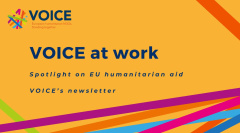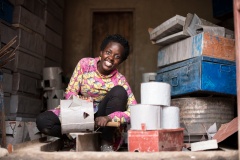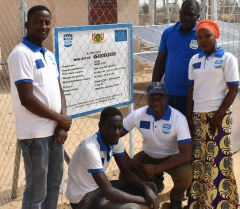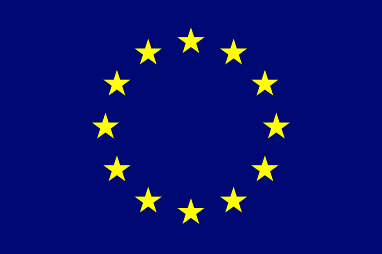Publications
Throughout the year, VOICE produces and disseminates key documents reflecting on humanitarian aid issues at the EU level and from an NGO perspective. They are addressed to decision-makers within the European institutions, at the National level, to NGO networks and other stakeholders of the humanitarian community, as well as to the VOICE members. Some documents are produced by the VOICE Secretariat with the support of VOICE members while others are publications from members and other key stakeholders in the humanitarian sector.
Please note that members-only documents will not be visible unless you are logged in.
-

Vulnerable children in Somalia could die waiting for help: World Vision op-ed
05 August 2022Millions of children in southern Somalia are facing starvation. More than 7 million people are experiencing severe food insecurity, 213,000 people are one step away from famine-like conditions. Read the op-ed from World Vision. -
Beyond Panic: Exploring Climate Mobilities in Senegal, Guatemala, Cambodia and Kenya - Case Study Report by WeWorld
03 August 2022Members' publicationsCase study research in four countries to explore the link between the environmental crisis and migration within the #ClimateOfChange campaign led by WeWorld and funded by the European Union in the framework of the DEAR Programme.
Who is a climate migrant? And how can we discuss the complex nexus between the climate crisis and migration in a manner that is productive and beneficial to those whose lives and livelihoods are most at risk from the climate crisis? These are some of the questions that this report grapples with and that have been the focus of much discussion throughout the #ClimateOfChange project. In seeking to answer them, the University of Bologna draws upon empirical research from four case study countries: Cambodia, Guatemala, Kenya and Senegal. Research was conducted by an interdisciplinary research team combining sociological, agricultural and food systems, human-geographical, and legal perspectives, together with partner Organisations in the field. -

VOICE Statutes FR 2022
28 July 2022VOICE Statutes 2022 in French -

VOICE Statutes EN 2022
28 July 2022VOICE statutes 2022 in English. -
Development Initiatives -the Global Humanitarian Assistance Report 2022
14 July 2022This report provides a critical overview of the crisis financing landscape. Development Initiatives finds that total funding has plateaued despite historically high demand. -
Secondary Impacts of the Conflict in Ukraine- MERCY CORPS
14 July 2022This report compiles case studies in the Middle East as it continues to experience ongoing conflict, political instability, economic turmoil, the consequences of climate change and mismanagement of natural resources, along with significant humanitarian needs. -
Dorcas Report on Older People in Conflicts 2022
13 July 2022This report presents how older people experience increased vulnerability in times of conflict, and how policymakers and the humanitarian aid sector as a whole do not yet pay sufficient attention to the specific needs of older people. Through this report, Dorcas aims to stimulate the debate on the rights of older people worldwide and to involve policymakers in the protection of their rights. -
VOICE Policy Resolution 2022 -An urgent call to protect principled humanitarian aid
29 June 2022VOICE policy resolutionsVOICE calls on the EU and its Member States (MS) to consistently uphold principled humanitarian aid worldwide through the adoption of the following set of recommendations:
-Principled humanitarian aid
-Funding share and allocation
-International Humanitarian Law (IHL)
-
VOICE out loud 33: Enabling principled humanitarian aid
23 June 2022VOICE out loudThis edition of VOL reflects on the existing humanitarian funding model, and the impact of IHL violations and donor sanctions regimes on the delivery of humanitarian aid. It also considers questions of how to finance new emergencies while ensuring no diversion of funding from other crises; how to promote and uphold IHL and reduce the level of risk to which humanitarian aid workers are exposed; and how to ensure that sanctions regimes do not undermine humanitarian organisations’ ability to apply the humanitarian principles of humanity, impartiality, neutrality, and independence. -

La hausse du prix des céréales survient alors que le financement de l’aide humanitaire est déficitaire
20 June 2022Pierre Micheletti, president of Action contre la faim France, alerts on the rising food prices affecting the most vulnerable countries. -

[Concept Note] VOICE Event on Funding Imbalances: how uneven prioritisation and insufficient funding affect humanitarian aid
20 June 2022 -

VOICE at Work - Spotlight on EU Humanitarian Aid
08 June 2022VOICE at workThe first issue of our public newsletter "VOICE at Work".
Table of contents:
The First European Humanitarian Forum – VOICE’s reflections
Supporting the most vulnerable: Our Members work in Ukraine
Climate resilience: We need to act now!
More funds to communities in need: Increased Humanitarian aid budget line in the EU annual budget 2023
Humanitarian Partnership Updates
Maria Groenewald, VOICE Director, interviewed by Défis Humanitaires
Humming Word: A humanitarian term explained
VOICE Members' publications
VOICE Secretariat's vacancies
VOICE Network's vacancies
Events and webinars -
The World's Most Neglected Displacement Crises 2021 - A report by the Norwegian Refugee Council
02 June 2022In this report the Norwegian Refugee Council shines a spotlight on a list of the ten most neglected displacement crises in the world, all of which are on the African continent. The conclusion of the report outlines the need for dedicated support and attention to improve the situation for people currently neglected by the international community. -

IRC Report on Hunger fallout: How the G7 can prevent the war in Ukraine from escalating the global hunger crisis
19 May 2022The IRC report shows how the impact of the war is compounding a pre-existing hunger crisis, with spotlights on four crises – Afghanistan, Yemen, the Horn of Africa and the Sahel, including impacts on women and girls. It includes an urgent call for the G7 and the wider international community to prevent the war from pushing other vulnerable communities closer to famine. -

VOICE Humanitarian Partnership Watch Group members' list (2022 - 2027)
19 May 2022HP Watch GroupAs foreseen by the group's ToR, the Humanitarian Partnership (HP) Watch Group must regularly be renewed. This document lists the members of the HP Watch Group for the 2022-2027 period. -

Finland and the Humanitarian- Development - Peace - Nexus
04 May 2022VOICE out loudIn this VOICE out loud article, Finn Church Aid explains why many Finnish NGOs are still facing challenges in adopting the Triple Nexus Approach. -
VOICE Annual Report 2021
29 April 2022VOICE Activity ReportsVOICE Annual report 2021. Read about the achievements and activities of the network over the last year. -

Action Against Hunger France's Recommendations- To Address the Global Impacts of the War in Ukraine on Food Security
25 April 2022Members' publicationsFaced with the many ongoing discussions and initiatives following the outbreak of war in Ukraine — particularly those related to an emergency plan for food security (Food and Resilience Mission) announced by the French government following the G7, EU, and NATO summits — Action Against Hunger France (AAH France) wishes to share its analysis of the impacts already underway in the areas in which it operates as well as the elements to be taken into account in these international initiatives. -
VOICE Reflections on the European Humanitarian Forum 2022
20 April 2022VOICE reaction after the first European Humanitarian Forum, in relation to:
• Humanitarian principles and International Humanitarian Law
• EU sanctions and counterterrorism measures
• Grand Bargain 2.0 commitments
• Climate resilience and greening of humanitarian aid
• Diversity and participatory approach -

New accessible website for Inclusive Disaster Risk Management now Live
11 April 2022Members' publicationsHumanity & Inclusion (HI) alongside partners COOPI in Paraguay, Save the Children Peru and USAID have launched their brand new website. This website is to promote disaster risk management with a focus on inclusion, placing the most vulnerable people at the center of risk management and as rights holders without exclusion or discrimination. -

Working in the Triple Nexus- A Reflection from Sweden
11 April 2022VOICE out loudAccording to Lakarmissionen the operationalisation of the Triple Nexus approach needs constant learning by both implementing organisations and donors. The organisation shares in this article some key recommendations on how to operationalise this approach from a Swedish perspective. -

Joint declaration of 11 French NGOs, reacting on the humanitarian aid donors’ declaration on climate and environment
11 April 2022Joint declaration of 11 French NGOs, reacting on the humanitarian aid donors’ declaration on climate and environment, calling on the “Commission to set up an accountability mechanism to monitor the concrete implementation of the commitments made by donors, through annual public reporting and the organisation of an annual exchange session". -

ICVA Statement on the Ukrainian Humanitarian Crisis – A Call for a Principled and Coordinated Response
08 April 2022ICVA Statement on the Ukrainian Humanitarian Crisis -

Finn Church Aid's briefing paper-The international impact of the war in Ukraine from refugees to food safety
06 April 2022Members' publicationsRussia’s war of aggression against Ukraine has immense consequences on European security policy. However, in the background there are other global effects possibly even larger in scale. This paper analyses this wider context from the perspective of the work of Finn Church Aid. -

Recording of the Grand Bargain exchange with EP Jan Egeland
31 March 2022This is the recording of the Q&A with the Grand Bargain (GB) Eminent Person, NCR Director Jan Egeland, DG-ECHO, and Germany, hosted by the German Mission in Brussels on 21 March.

